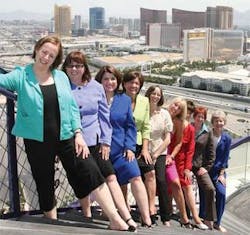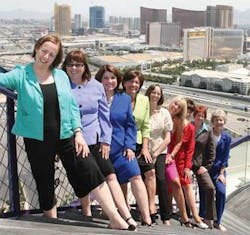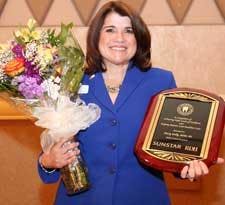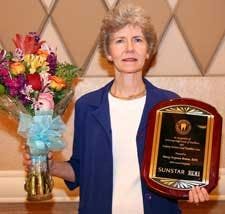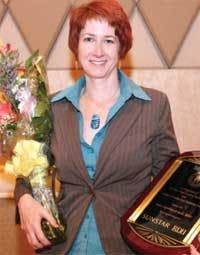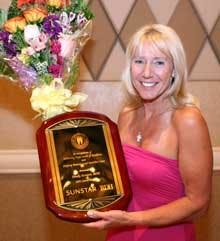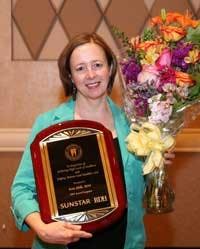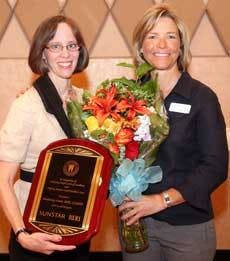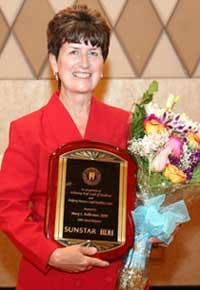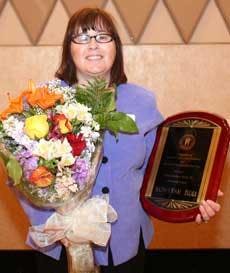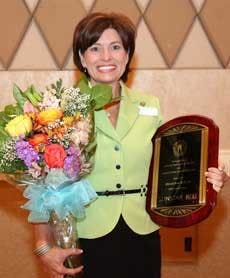2009 Sunstar/RDH Award of Distinction
by Cathleen Terhune Alty, RDH
Sometimes there are winners in Vegas! At the always–fabulous Under One Roof conference in Las Vegas, nine amazing dental hygienists were recognized for winning the eighth annual 2009 Sunstar/RDH Award of Distinction. This award recognizes some of dental hygiene's best and brightest for making a difference in their communities and helping their patients live healthier lives. Far from being just a desert mirage, the hygienists who attended enjoyed luxurious accommodations, great educational sessions, and a chance to meet new friends and renew old friendships. Meet our newest award winners, whose passion and professionalism outshine the lights of the famous Las Vegas Strip!
Mary Kelly, RDH, Des Moines, IA
Meeting the dental health needs of low–income children is a good slogan for Mary Kelly's career. She graduated from Loyola University of Chicago with a certificate in 1981 and a BS in dental hygiene in 1982, and has been in general practice for 29 years in metro Chicago and Des Moines.
Mary has worked the past 11 years in public health. She worked at the state health department at Iowa Head Start, and is presently working at the Des Moines Health Center. She is involved in many health coalitions, including Healthy Polk Oral Health Work Group, Drake University, Des Moines Public Schools Head Start Health Advisory Boards, Iowa Public Health Association Oral Health Work Group, and the Early Childhood stakeholders' coalition. She is proud of her early childhood program involvement, and the numbers are certainly noteworthy. Mary has educated, screened, and referred 15,917 children, placed fluoride varnish on 6,651 children, and placed sealants on 5,758 children. She also worked with families by distributing home care supplies for all family members and communicating directly with them about the child's dental issues.
Family facts? She is married to Mark, and has a daughter, Kelly, and a son, Corey.
If she could change one thing in the world? “I'd like to be out of a job due to lack of oral health problems, but that just isn't going to happen, so it has to be equal access to oral health care for all.”
Heroes? “I'll focus on my dental hygiene heroes. I've been a hygienist for almost 30 years so I'd like to include one from each decade.
Sue Sauer Collins, my instructor who taught me discipline with a touch of humor while I was in school, then years after graduation taught me that anyone can accomplish anything!
Colleen Dooley, a Des Moines private practice coworker who always takes the initiative to implement newly learned ideas!
Sue Hyland, my coworker who has always been in public health so she has never practiced traditional clinical hygiene. As our program evolved and grew, she refreshed her clinical skills and learned sealants! Sue has a great balance of family, church, work, volunteering, and taking time for herself.”
Secret weapon? “Not so secret: the ADHA.” She explains, “I know that access to care and patients' oral health in private and public practices would not be where it is today without the resources and support of the ADHA. Through my ADHA membership and attendance at local and national meetings, many inspirations and ideas for changes to improve the public's health have come through networking and educational opportunities.”
Nancy Ferguson Brown, RDH, Morganton, N.C.
Public health ministry is Nancy Brown's delight. “Through example and dedication, I've educated, demonstrated, and motivated others to impact oral disease, going beyond my public health role,” she writes in her nomination letter. Nancy has served 30 years as a public health educator and community health advocate. Prior to hygiene, she attended nursing school. “While waiting to be licensed I worked as a hospital pharmacy tech. I attended Guilford Technical Community College in Jamestown, N.C., and graduated in 1977. I worked for approximately one year in private practice and 30 years in dental public health for the North Carolina Oral Health Section in Morganton.”
Nancy says she motivates by example and puts her words into action. “I've also impacted the community through leadership service in my local Foothills Dental Hygiene Component of the North Carolina Dental Hygiene Association,” serving as president, treasurer, and delegate. “I am in regular contact with my local and state officials on health care issues.” She assisted the health department with an early childhood Smart Start initiative, establishing a dental clinic and community preventive dental education program. Nancy also chaired a four–county task force working to establish a mobile geriatric program for long–term care facilities, and dresses up in a pink skunk suit to educate children about the harmful effects of smoking. “I developed and manage Teeth in Need, a dental treatment program for uninsured children.”
Family facts? “I've been married for 24 years to Thomas E. Brown from Morganton. We met in the dental office where I first worked. We have no biological children, only my adopted public school children I work with! I have an orange marmalade cat named Goldie Boy.”
Heroes? “Caroline Kennedy Schlossberg. I have great admiration for her courage and strength.”
If she could change anything in the world? “Mediocrity or indifference.”
Secret weapon? “An intangible ‘weapon' in clinical care is to accept your patients for who they are and try to love them in spite of their faults.”
Janet Aquilina Arnold, RDH, Burlington, Ontario
Nominated by Cate Grater–Nakamura
Comprehensive care for patients with oral–nasal–pharyngeal cancer is Janet Arnold's passion. “I did not have a career prior to dental hygiene,” she said. “My first memory of thinking something in the dental field might be ‘fun' was in first grade. I was having a filling done and I thought it looked like a lot of fun to use the suction.”
She graduated from dental hygiene in 1985 from Seneca College, a community college in Toronto, Ontario. Janet's nomination letter emphasizes her compassion and concern for medically compromised patients. For five years she practiced at the Princess Margaret Hospital, a major cancer center in Toronto. “I am presently practicing part–time in a private dental practice, studying for a university degree in dental hygiene, and speaking on the virtues of dental hygienists performing intra– and extraoral examinations in the hopes of seeing the dental hygiene profession realize its potential in contributing to changing the face of oral cancer.” She has conducted oral care seminars for cancer patients and is developing a partnership with an adult day program for intellectually challenged adults.
Family facts? “I've been married for 24 years to Wayne. I have a son who is 21 and a daughter who is 18. I have a Greyhound that I adopted from a track in Florida.”
Heroes? “I have two — Cate Grater–Nakamura and Kim Ivan. Cate and Kim are RDHs who not only represent for me the best of the dental hygiene profession, but are also all– around good people. Cate is my colleague, mentor, friend, and sister. Kim is a colleague and long–time friend. Both of these ladies stand firm to their ideals (both professional and personal), and they are admirable and selfless. I aspire to be like them!”
If she could change anything in the world? “Hmmm. Tricky question. How to narrow it down to just one? I'm going to say that I would change gender bias — people around the world would not be judged by virtue of their gender.”
Secret weapon? “My empathy.”
Sandy Kemper, RDH, Seattle, WA
Nominated by Sharon Golightly, RDH, EdD
Sandy Kemper makes a difference in the U.S. and Bolivia through her non–profit organization called “Smiles Forever.” A trip to Bolivia with Dental Outreach was a life–changing experience, according to Sharon Golightly, who nominated Sandy. Sandy said, “I practiced mostly in one office for about 28 years in Seattle. But in 1999, I took a humanitarian trip with a group of dentists to Cochabamba, Bolivia. To make a long story short, I was really upset that there was no preventive dental hygiene care in the homeless women's shelter where I worked while in Bolivia. Also, the women from the homeless shelter received no vocational training, and most returned to live in the homeless shelter with their children.
“So with the help of friends and fellow hygienists, we developed a two–year traditional dental hygiene program that has been accepted by the Bolivian government and the Dental Society of Cochabamba. As the students progress through the program, they and the professors (Bolivian dentists who have dental hygiene training) provide preventive and restorative services to 5,000 homeless people a year. We have 20 graduates so far, and eight new students this year. Besides the clinic at the homeless women's shelter (Madre de Dios), we have also opened a fee–for–service dental clinic with the help of an international rotary grant. Senior or graduate dental hygienists provide cleanings and restorative services at reasonable fees. This allows the Bolivian public to see firsthand how capable our students are to give back to their own community.
“These students (indigenous women of Bolivia) are considered incapable. There are huge class differences, although most of the population of Bolivia is indigenous. The clinic is starting to make a profit, and our goal is to be able at some point to make enough money to run the framework of the school. We also have a community service project where we provide emergency dental care and fluoride varnish to schoolchildren in rural communities outside of Cochabamba. Last year I spent eight months in Bolivia working in the school. Up until that point I would come every year for a month only. My husband and I adopted a baby at 10–days–old with a cleft palate. That is a whole other story. We want to continue helping these children.”
Sandy attended the University of Washington for two years, then spent two years at the University of Iowa in the dental hygiene program, where she received her B.S. in 1976. “This year makes 33 years that I've been practicing dental hygiene. I've always been a hygienist except for part–time jobs in college. I always wanted to be in the health–care industry helping people,” she said.
Family facts? “I have three children, a 26–year–old boy, a 19–year–old boy, and an 18–month–old baby I would love to share photos of.”
Heroes? “My heroes really are my mom and dad for showing me the value of education, faith, love of family, and community service.”
If she could change anything in the world? “The one thing I would change in the world would be extreme poverty. I call it misery. I would love to plant the seed in everyone's mind that it is our duty to share our wealth globally.”
Secret weapon? “I don't know how secret it is, but I never browbeat patients. It's been my experience that flossing alone doesn't cut it, so I try to get patients to use a rubber tip, Stimudents, or anything that applies pressure on the gum tissue without browbeating them. ”
Kate Mills, RDH, Bainbridge Island, WA
Nominated by Carol Bruce, RDH
Kate Mills offers care and compassion as she reaches beyond private practice dentistry to a low–income, underserved population that does not receive regular dental care. Carol Bruce explains, “Her focus is on prevention and she uses the newest materials and protocol for her patients. Many of us talk about serving low–income, disenfranchised populations, or volunteering a day or so each year. But this is Kate's full–time work.” Thanks to Washington State's dental hygiene law, hygienists can practice unsupervised in senior centers and schools. Her nonprofit dental hygiene services business, Washington State SmilePartners, helps people who do not have access to affordable care.
Kate says that dental hygiene is her first and longest career. “I graduated from Clark College in 1971. I've practiced the whole time, even when attending art school in the '80s. I've worked in private practice, for general dentists, periodontists, and a prosthodontist, in Washington, Oregon, and California. In my quest to “find something more,” and in a time when there were limited opportunities for dental hygienists, I worked as a clinical instructor and for Fred Hutchinson Cancer Research Center.
“When I lived in Sacramento, I found my passion — public health. It was there that my eyes were opened to the incredible need in the population that most of us don't see in private practice. I worked in the County Health Department's sealant program, and after moving back home to the Pacific Northwest, I started the nonprofit Washington State SmilePartners. We now have three programs staffed by dental hygienists — a school–based dental prevention program, a senior program, and a program in a hospital for low–income pregnant women.” (See smilepartners.org for more info.)
Kate says more hygienists are needed to help this population. “I feel very honored to be part of a group of unique and dedicated hygienists in Washington, the Alliance of Dental Hygiene Practitioners. All of us work in the community in nontraditional practice settings, and twice a year we come together for support, inspiration, and to share successes and challenges. I'm encouraged when I see more hygienists interested in this kind of practice.”
Heroes? “I have lots of heroes: Eleanor Roosevelt, Ann Richards, Hillary Clinton. Christopher and Dana Reeves are the ones who keep me going when I'm tired and particularly challenged. They both spoke at my daughter's graduation at Middlebury College in 2004. I was moved as Dana spoke about rising to the occasion, even when you find yourself in a situation you never dreamed of, and recognizing an opportunity to make a difference in the world. Superman, struggling to talk through his tracheotomy, talked about the power of one person to create a meaningful change. He pointed out the woman who had the idea to form the 9–11 commission, even when she didn't have the slightest idea where to begin. He encouraged all of us to start on the path to making the world a better place, even if you are only one person and the obstacles seem too big and hostile to face.
If she could change anything in the world? “I would eliminate war and create more empathy and compassion.”
Secret weapon? “I wish I had a secret weapon. I suppose that my job as a dental hygienist becomes very clear when I consider the patient — his or her needs, perspective, desires, values, culture — and not my own. ‘Selling' dental treatment to patients to increase the bottom line or appeal to a particular practice's needs, perspective, desires, values, and culture has been the pendulum that has swung dentistry toward the health business and away from health care. I want to push it back the other way.”
Kimberley Grant, RDH, Ash Grove, MO
“Relationships are a two–way street, and they can either take you a short distance or on a long, scenic drive. You might as well enjoy the ride,” writes Kimberley Grant in her nominating letter. Focusing on the oral/systemic link between health and oral health connects her to the patients. “Not everyone has the same motivation for oral care. What is important to one patient may not even cross the radar of the next. I try to find a link that connects with him or her so the person understands the importance of good oral care. For a teenage boy, this may be how plaque/bacterial load can cause bad breath, which the girls find offensive. This gives me a line of discussion for better oral hygiene. For a pregnant woman, discussing how oral bacteria may be related to preterm labor is a good way to help her understand the importance of better oral hygiene. For an elderly man, finding out that the calcium channel blocker he has been taking for years is a possible cause of his ongoing gingival inflammation.”
Kimberley's career path never veered — it went straight for dental hygiene. “I went to college for prerequisites right out of high school and followed with dental hygiene school. I went to Missouri Southern State College in Joplin and graduated in 1987. For the first nine months of my career I practiced in a dental office in Marshfield, Missouri; then in 1988 (the week after I got married), I moved to the practice I'm currently working with in Willard. I'm active in ADHA and my state and local components. I've been involved with many community dental health programs, including health fairs. I also have my paramedic's license, and achieved critical care paramedic, the highest certification for paramedics in 2000.”
Family facts? “I've been married since 1988 to David. We have two children. Our son, Jacob, is 17, and my daughter Aiden, is eight.”
Heroes? “My late mother is my hero. She taught me love, kindness, forgiveness, honesty, and integrity. She was the kind of person who loved everyone and everyone loved her.”
If she could change anything in the world? “I'd want to remove dishonesty. Trust is important in nearly every kind of relationship, and to be dishonest is to lose one's trust. The world would be such a different place if there was no dishonesty.”
Secret weapon? “Exceed the patient's expectations. Do more than just what is required — make them feel like they're your number one patient each time you see them.”
Mary Kellerman, RDH, Billerica, MA
I am sure Mary Kellerman's patients are overjoyed that flat feet kept her from becoming a ballerina, as her dental hygiene career has taken her around the world and back again.
She graduated from Forsyth in Boston in 1966, and some years later went to Boston University's Goldman School for Dental Public Health, where she graduated in 1991. She has been in dental hygiene 43 years and she's still going strong! Mary has run a successful fluoride campaign, volunteered for numerous dental programs, served low–income communities in Massachusetts, and her tobacco cessation programs have helped many quit the habit for good.
She's a member of Project Stretch for children, serving on several dental mission trips. “It has been very rewarding,” she writes in her nomination letter, “to be able to have the opportunity to visit the children in Venezuela in 1997, Nicaragua in 2003, Mexico in 2005, Cape Verde in 2006 and, a separate relief mission to Zambia in 2007. Last year I went to the Ward 9 area in New Orleans, where there still exists a continuous oral health need in our country.” She was the recipient of the Dr. Esther M. Wilkins Distinguished Alumna Award at Forsyth 2007.
“I must say that I was very moved to receive the award and felt so proud to receive it from the person for whom the award is named. Dr. Esther Wilkins is not only recognized for her teaching and hygiene books, she's a dental hygienist!”
Family facts? “I have a great husband, Arthur, who cooks. He is a retired sixth grade teacher, Boston Crusader Drum Corps and Red Sox fan. My daughter, Beth Anne, lives in Albany with her New York Yankees fan husband and my two wonderful grandchildren: Xander, five, and Zara Rose, two. My 94–year–old father swims daily in Venice, Florida!”
Heroes? “I'll pick Dr. Esther Wilkins for all she has done for hygienists. She is a friend to all, young and old, plus she has updated her book 10 times, keeping up with the pace in dental hygiene.”
If she could change anything in the world? “I guess I'd wish that everyone could have good and affordable health care, including dental. Even better, I'd wish for access to the preventable measures we have available today with fluoride varnish and sealants, especially knowing the systemic link to total health issues, such as preventing heart disease and having healthier births and lives.”
Secret weapon? “I think that I still write little side notes down about patients, about their families, what they do for work or hobbies, etc. A lot of my patients come from countries like El Salvador, Brazil, China, Russia, Haiti, Cape Verde, India, Ethiopia, to name a few. So I also have them write down for me the words that are ‘open,' ‘teeth,' ‘brush,' and ‘floss,' and I have many of these on Post–its inside my cabinet, and when they return I have them handy. Patients say they like that I try to learn some words in their language. I now say words like abre, dientes, brosse, and fil dentaire. I think this has won me many dental patient/friends from many lands!”
Elaine Diane Siebers, RDH, Oxnard, CA
Nominated by Noel Kelsch, RDHAP
“Elaine has done more for the community than any hygienist I know,” writes Noel Kelsch in her nomination for Elaine Siebers. Involvement in the community with the goal of improving oral health is Elaine's passion. Elaine's career began as a dental auxiliary. “I was a registered dental assistant for two orthodontic practices for 10 years before I finally made the leap to dental hygiene, though I knew what I wanted to be even as a small child. I remember getting up on the sink and wiggling my baby teeth out. It was so interesting to me.”
Elaine graduated in 1983 from West Los Angeles College in California, and finished her BS degree in 2000 from the University of St. Francis in Indiana. “I have practiced dental hygiene for over 25 years, 23 years at the same general practice of John B. Graeser, DDS. I have also worked as a dental hygiene instructor for over 10 years at Oxnard College Dental Hygiene program in California. I help instruct junior clinic, radiology lab, dental health seminar, and my big passion, community dental health.” Elaine has helped implement a grant for school–age children for brushing, flossing, and weekly fluoride rinses, as well as a xylitol mints school district program for children to take after breakfast and lunch.
Family facts? “I have been married for over 20 years to my husband, Glenn, and I have a stepdaughter named Melissa. I am also a grandmother, to our favorite (and only) grandchild, Isabella.”
Heroes? “Actually I have quite a few heroes. First my family, next my coworkers, and last but not least, all my past students who have taught me so much in life.”
If she could change anything in the world? “The one thing I would change in this world of ours is world peace. I'd wish for everyone to band together to help one another, versus each country trying to outdo another. Can you imagine a world without crime, disease, and with help for the mentally disabled?”
Secret weapon? “I think my most precious dental hygiene secret weapon is my humor. I love to laugh. I try to make all my patients feel comfortable and nonthreatened or chastised when they come in. I do not want them to feel like they are going to confession, telling me their sins of not flossing every day. I try to encourage them to make life simple by creating what can be an easier and healthy solution for them. By using this technique I have many faithful followers.”
Rhonda Ford, RDH, Jackson, TN
“What is harmful for the teeth is harmful for the body,” writes Rhonda Ford in her nomination letter. “My patients are inner city teens living in the poorest area of our city. Over 80% had gingivitis and/or periodontal disease when I cleaned their teeth. At least one in three patients had severe caries and no knowledge of cause or prevention.” A 1980 graduate of the University of Tennessee Health Science Center in Memphis, Rhonda has practiced for 28 years in Tennessee: two years in public health, 22 years in private practice, and four years with nonprofit “Smiles and Blessings … for children of all nations” where she is director of programs and a hygienist after starting the program in 2004.
Rhonda got out of her comfort zone to bring the good news of oral health to teens at risk. She implemented a community “Give A Kid a Smile” program with Dr. Christian Culbreath to increase awareness of the obstacles of dental care access. “Currently we have implemented the first preventive/emergency dental center in an inner–city high school in Tennessee.” She also founded a nonprofit corporation, Smiles and Blessings for Children of all Nations. It is “a mission created to provide oral health education, training, and services to children in the slums of Brazil. Since 2004 I have spent a portion of my summer serving in Brazil and Nicaragua foreign missions,” Rhonda writes. “This led me to also be connected and passionate about the oral health of children/youth in my own community.”
Family facts? “My son, Cole, is 22 and will graduate this fall with a pre–engineering degree in concrete management. He is currently on mission with me in Brazil for a month. My daughter, Callie, is 21 and will graduate in one year with a business degree focused on organizational management. She has also served with me on numerous Brazil missions, implementing dental hygiene in poverty areas. I also have temporary guardianship of Autumn, a 17–year–old attending the inner–city high school where our clinic is located. Autumn has lived with me for three months and is serving with me in Brazil on the dental hygiene missions this summer.”
Heroes? “A hero is someone who saves, and only Jesus Christ saves long–term!”
If she could change anything in the world? “That people all over the world would come to know the true love of Jesus Christ through having their health needs met nutritionally, dentally, and medically.”
Secret weapon? “I have always been enthusiastic and positive with my patients. My gift lies in being able to cross cultural and other barriers, putting myself in their place, always an equal and never a superior, blessed to be their oral health educator and ‘prayer warrior hygienist.' I love my patients and they feel it!”
